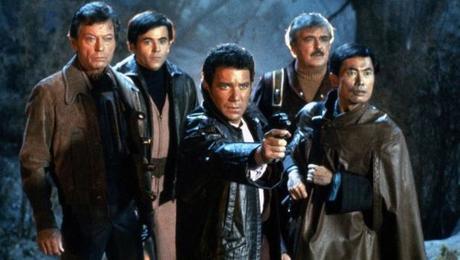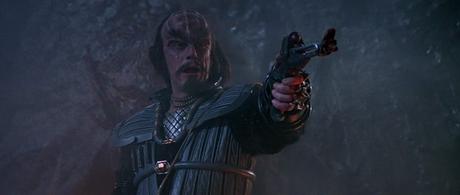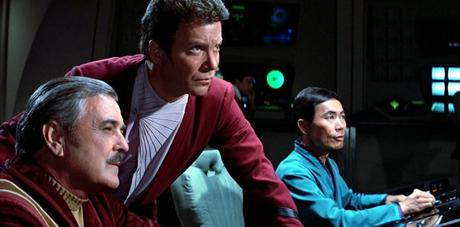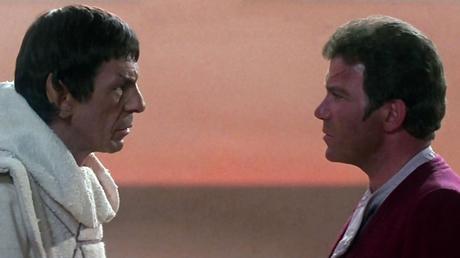The Star Trek Re-Watch - Star Trek III: The Search For Spock

One of the positive consequences of the COVID-19 pandemic, has been the ability for people to explore television shows and films they never got around to see. This of course comes with the caveat that one actually has time to do so. Depending on certain circumstances (i.e. children or lack thereof and the essential nature of your job) this may or may not be the case. Nevertheless, millions of people who didn't have free time before now have the opportunity to watch every episode of The Wire or the entire Harry Potter series.
With that in mind I thought it was high time to explore some gaps in my film and television lexicon. So of course I completely scrapped that idea and decided to re-watch every one of the thirteen Star Trek films that have been released since 1979. We continue on our journey down the warp lane with the film that forever changed James Kirk's story-line - Star Trek III: The Search For Spock.
Star Trek III: The Search For Spock (1984) Director: Leonard Nimoy Written By: Harve Bennett Starring: William Shatner, Leonard Nimoy, DeForest Kelley, James Doohan, George Takei, Walter Koenig, Nichelle Nichols, Christopher Lloyd, and Merritt Butrick.
Plot: After the events of Wrath of Khan, the crew of the U.S.S. Enterprise returns to Earth, only to find that the Enterprise is to be decommissioned and the crew is forbidden from speaking about the Genesis Project. Meanwhile James Kirk's son David Marcus and Saavik explore the Genesis planet only to discover that Spock's body has begun to regenerate due to the effects of Genesis. Meanwhile Kirk and the crew discover that before dying, Spock transferred his katra (living spirit) into McCoy. In a desperate gambit the crew of the Enterprise steal the wayward ship and head towards the Genesis Planet to rescue Spock. However, unbeknownst to them, a rogue Klingon commander named Kruge has also learned of Genesis and is bound and determined to possess the power for himself.
Re-Watch Review: After the unquestioned success that was Wrath of Khan, it was imperative that Star Trek as a franchise continue its success. The likelihood of a sequel was almost assured due to the financial and critical success of Khan and the fact that the previous film ended on a cliffhanger. Was Spock really dead? Audiences had to wait almost two years to find out. While Paramount had hopes Nicholas Meyer would return to the director's chair, Meyer ultimately passed because he was upset with changes the studio made to The Wrath of Khan. Enter Leonard Nimoy who up until this point had mostly directed television in the 1970s. However, the success of Khan and the direction his character went in the film reignited a passion for the character and, after some initial reluctance from studio chief Michael Eisner, Nimoy was given the keys to the warp core.
While The Search For Spock doesn't match The Wrath of Khan in emotional depth or space battles, it nonetheless is pure Star Trek and proves to be a memorable entry in the franchise. Just like the previous entry, the film had a relatively modest cost ($16 million) that earned over five times its budget back at box office and was also a critical success. What makes Spock stand apart from other films is that the crew actively works against Starfleet in this film. While Kirk had always flaunted the rules when it served his purpose, the theft of the U.S.S. Enterprise by the main crew members is out and out mutiny. It represents an incredibly noble and incredibly stupid action by Kirk and company. For them the needs of the one (Spock) outweighed the needs of the many. Moreover this is a film that deals with spirituality (Spock's katra) something Gene Roddenberry absolutely abhorred and an element that turned him off to the movie.

Spock also re-introduces the warrior race the Klingons into Star Trek lore. Aside from a brief cameo in the first film, the Klingons as a whole really hadn't factored into the franchise since TOS. That changed in a big way with Kruge and crew. Christopher Lloyd (pre- Back to the Future) is excellent in the role, proving villainous, single-minded, and ruthless. In some ways he's a darker reflection of Kirk. Under Kruge, Kirk's son David is murdered, an act that ultimately shapes Kirk's opinions on Klingons and comes home to roost in the sixth film. (Check back for my article on The Undiscovered Country for more on that.) It's a powerful scene even if Shatner's performance is more than a little hammy.
The Search For Spock also puts The Wrath of Khan in a new light when it's unveiled that the Genesis Project is actually an abysmal failure. Yes the Effect does create life from lifelessness but because David chose to use proto-matter, it causes the planet to evolve at an accelerated rate, ultimately causing the planet's destruction. Much like his father, David let his ego and hubris get in the way, something Saavik calls him out on. What's fascinating is how the evolution/destruction of the Genesis Planet is reflected in the aging of Spock. While it serves as a nice deus ex machina to get Spock to an age so that Leonard Nimoy can once again resume the role, it never feels that way.
Speaking of Nimoy his direction is superb in this film. He keeps a tight, consistent pace throughout the entire movie, with the picture running a brisk 105 minutes. What's great is that Nimoy's able to blend a heist film (the theft of the Enterprise), a rescue mission, and a poignant drama brilliantly. Despite distinct elements to Harve Bennett's script (which is strong), it never feels tonally out of balance. James Horner once again returns to score The Search For Spock and while his music doesn't meet the epicness of Wrath of Khan, its nonetheless rousing and exciting. Ditto the special effects, especially the final confrontation on the Genesis Planet between Kirk and Kruge.
The Search For Spock also continues the theme of sacrifice begun with Khan. In this case two key sacrifices are paramount. The first (the death of David) I've already touched on. The second is Kirk's decision to destroy the Enterprise. In a sense Kirk loses two children in Spock. The U.S.S. Enterprise has been his home for the better part of twenty years at this point. This was not an easy decision but the act was exactly what Bones says it was, "turning death into a fighting chance at life." Rather than let the Klingons gain control of the Enterprise and more detailed information on Genesis, he destroys the ship. Some may say in a cavalier fashion, "ah it's just a ship." Bullshit. There's so much history and emotion associated with the Enterprise. The decision must have been a true gut punch.

In the end the crew's mission is successful, with Spock's katra being returned to his body. What's great about the conclusion to The Search For Spock is that it accomplishes the same goal of Khan. Specifically, it's a cliffhanger. The crew of the Enterprise are now literally criminals. What's in store for them next? They also now have no ship. How will they resolve that? As the words at the end of the film imply, the adventure would continue, but I don't think anyone expected where Star Trek IV would eventually go. In a word (or two words to be precise) "space whales."
But that's for next time...
My rating System: Next Up: Star Trek IV: The Voyage Home!!!!
